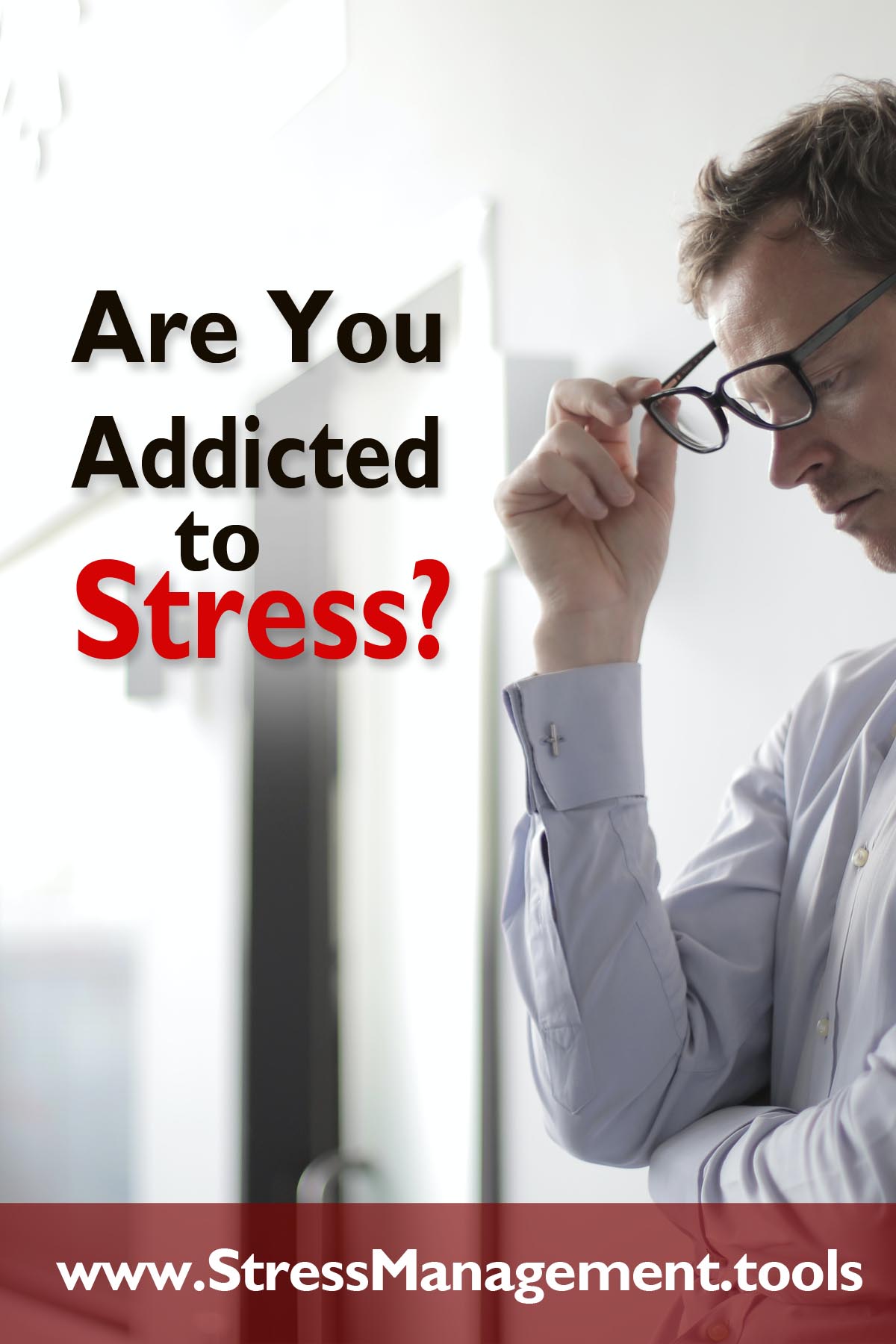When you think of things you might be addicted to, stress is never on your list, is it? Some people might put alcohol or nicotine, caffeine or even social media – but stress isn’t even considered.

The idea of stress addiction might seem rather strange, thinking that most of us hate feeling stressed. However, many people don’t realize it, but stress can become an addiction over time. It’s all due to the subtle scientific reactions within your body, when the stress hormone cortisol floods your system and allows you to deal with harrowing situations.
Your adrenaline increases and you find yourself powering through tasks and completing projects with ease. When you’re not under pressure, you find yourself dragging on, procrastinating and struggling to the finish line.
Some people laugh this off by saying they “work better under pressure,” and this is why. It’s an addiction to the stress from a chemical standpoint. It’s not just a mental preference.
The problem is, when you start suffering from chronic stress, it not only puts your health at risk, but it also affects your personal and professional relationships. Over time, your quality of life diminishes and you reach a point where you’re unable to accomplish anything without stress – a very sad way to live your life.
What Does It Mean to Be Addicted to Stress?
Stress is something that can give you a reaction in the brain that’s a similar feeling to what you get from taking drugs or drinking alcohol. This kind of high is a result of the brain releasing chemicals that make you feel good.
Some people may not realize their stress addiction until they start analyzing their habits. If you tend to procrastinate until something happens that puts pressure on you where you get a dose of stress and use it to fuel your productivity, that’s a stress addiction.
You feel good because have a lot of energy and your feelings are high. All of this occurred because of whatever stress that happened. You can also tell if you’re addicted to stress by what your life looks like.
There’s rarely any peace within it. In fact, your life is like an advertisement for stress. You’re rarely calm and you’re always frazzled. You don’t find it boring because there’s always something going on.
There are rarely any down moments because you’re too busy racing from place to place. It feels like you practically live in your car because you’re never getting any down time.

Relaxation isn’t something that’s in your vocabulary. You might think about it every now and then, but you don’t ever get to do it. Or, it could be that you’ve got a full load of pressure.
There’s drama and stress and it always seems like there’s a personal or professional fire to put out. You might be stretched too thin, feeling like you’re burning the candle at both ends, but it doesn’t really bother you.
Life isn’t bad, you tell yourself. It’s just hectic and when you handle all the stressors that come your way, you end up feeling empowered, like you’ve accomplished a lot. An addiction to stress also manifests itself by what you reveal about your life to other people.
One way that people do this is by putting stuff on social media. For you, social media isn’t really a place you go to in order to see how your friends or family are doing. It’s usually all about you – how other people made you mad, hurt your feelings or took advantage of you in some way.
You’re always posting that kind of stuff on social media and the topic centers around your stress – how hectic everything has been for you or what’s going on in your day and how that turned into stress.
You might talk about why you feel so stressed out – because you didn’t sleep, haven’t eaten, aren’t making enough money at your job, had a fight with your friend and how you’ve always been the one compromising and not her or him.

Or you might mention how angry or anxious you are because of what you went through in the past or because of emotional issues now. On your social media, you get online and bemoan often in detail what’s going on in your intimate relationship or with your family or coworkers.
You talk about what awful thing was said to you or what bad thing you had to deal with, like you had to do more than your fair share of work. You talk about the pressure that put on you and how you worked late and rushed home and didn’t even get to eat.
Stuff like that happens to everyone because life itself can be hectic. But the thing about a stress addiction is that you post things like this all the time and it’s a huge deal to you. You talk about putting gas in your car and it becomes an effort comparable to running a marathon.
Or you mention going to the grocery store and what the store was out of and how someone cut you off in line or failed to return their shopping cart. You might talk about the effort it takes to pay the bills or get the dog to the groomer.
Nothing that you talk about is ever a simple task or enjoyable. There’s always drama and stress associated with it. Whatever you do can’t just be a normal thing. It always has to be bigger and more stressful than the situation calls for and much worse than what anyone else is dealing with.

What you don’t realize is that others on social media who also deal with stress will start to view you as a drama magnet. They’ll think that nothing in your life can ever be simple – that it always has to be bigger than it really is.
People who are addicted to drama are usually posting negative things or complaining non-stop about their life. When you talk to people at work or your friends or family, your life is all about the stress and you don’t really feel bad about all that because to you, your stress isn’t a bad thing.
It’s something that’s part of your life and you’ve become used to enjoying the high that it gives you to be a fighter. Be aware that when you begin garnering that kind of reputation, people will avoid you. This adds to your stress, but you’ll just use it to fuel your fire even more.
Consequences for Failing to Break Your Stress Addiction
You know how life goes. There’s always something that interrupts your plans and it happens on the day when you can least afford to encounter a stressor. You might be on your way to work because you have to go over a project with your boss before the client gets there for a scheduled appointment.
But the next thing you know, you’re trapped in a traffic jam. There’s no way around it and you can’t turn back. You’re just stuck. When this happens, your body reacts and floods your system with stress hormones.
The reaction from your body is based on the fight or flight response and it’s meant to be a help to you. However, when the situation isn’t life or death, this response isn’t needed.
When this is an occasional circumstance where you get a flood or stress hormones, it’s not a big deal.
But you start to have it even when you’re dealing with a mundane stressor because you don’t know the right coping techniques to turn to. When your body is constantly getting this flood of hormones, it affects you by giving you that brain chemical high.
It’s easy to get addicted to wanting to get that boost of chemicals. You feel good to some degree when you first get it, but over time, this constant cycle of having a stress response within the body wreaks havoc on your physical health.
Over time, the overuse of your stress hormone starts to take a toll on your immune system. This happens because your body has something known as natural killer cells. These are designed to battle against serious conditions such as cancer, but these cells are also designed to fight things like bacterial or viral illnesses.
They work to protect your immunity. Stress weakens the ability of these cells to work the way that they’re supposed to, leaving you with little protection so you’re constantly catching whatever is going around.

It’s not just illnesses that you’ll face more often when you fail to break your stress addiction. You’ll be at a higher risk for developing conditions that are related to stress such as diabetes.
When you get stressed, it raises your glucose level – even if you don’t have the disease.
Stress can make you more likely to have a heart attack because when you’re stressed, your blood pressure goes up.
The flood of stress hormones that you get are supposed to temporarily narrow your blood vessels. But when you’re addicted to stress, these blood vessels can be constantly narrowed, which restricts blood flow and oxygen to the heart.
When you’re stressed, it can also affect your digestive health. You can develop nausea, stomach cramps and suffer from diarrhea or constipation. You can also suffer from heartburn.
People who are addicted to stress can develop reproductive problems. Women might skip a monthly cycle or they might notice that their periods last longer, while men can experience lower levels of testosterone, which is linked with impotence.
But it’s not just your physical health that will show the signs of stress. You can also struggle with mental health. For many people, prolonged exposure to stress, such as with a stress addiction, can cause depression.
This happens because the stress hormones linger, and you don’t get that break from them that you’re normally supposed to get. It’s common for stress to have an impact on your emotions and when you constantly get that flood of stress hormones, it brings out negative feelings such as grief, which can lead to depression.
Anxiety is another consequence of not dealing with a stress addiction. You don’t have to have an anxiety disorder to develop anxiety. This is something that happens as a result of whatever stress you have in your life.
When you have anxiety, it can show up as both physical and emotional symptoms. When it has to do with your mental health, the anxiety that you experience usually reveals itself through a feeling of dread.
You might feel nervous at random times or consistently. Sometimes anxiety can show up as feeling like something is just off. You feel wary. This mental reaction can happen whenever you’re about to face a situation or when you think about that situation.
It can also happen because you fear the results of a situation. When stress is what’s behind your anxiety, then what you’re experiencing lingers and doesn’t just go away. Not dealing with stress can also lead to panic attacks.

A panic attack is what happens when you get a feeling of overwhelming fear or you experience a deep anxiety. Panic attacks can happen with or without physical side effects.
Many people who have stress and develop panic attacks have these because of something in the past that they haven’t dealt with, stress addiction, or something that they’re afraid of that might occur that hasn’t happened yet.
A panic attack is a sense of impending doom, even if nothing bad is going on at the moment or they’re not in any danger. These attacks are a clear sign for the person who has them that something needs to be treated so that it can end.
When a panic attack disrupts your daily routine and you have difficulty being able to carry on, this a severe episode and may need professional treatment. As a result of your mental health suffering because of stress, you can start feeling dissatisfied with life.
You just feel like something is missing. This can happen when you’re not happy with the person you are. You might experience self-doubt along with this dissatisfaction. You might also have low self-esteem and you don’t like what you see when you look in the mirror.
You don’t like your job, your relationships, or where you stand in life. It’s at this point that many people start turning to coping addictions to try to fill the void and feel better about themselves and their lives.
Just an addiction is not going to help you to get anywhere in life. It is not going to resolve your problems, but just adding to them. You may feel good being addicted to stress, but it does not get you anywhere. If you find that you are having a stress addiction, you need to learn techniques to deal with your stress in a more constructive way. Download the free 10 Minute Guide to Stress Management to start your journey in learning how to dominate your stress.
Do you need a guide to help you understand how to cope with Stress in an all inclusive approach? Learn how to combat stress, mentally, physically, emotionally and strategically in your life.

Martin Neumann was trained for Lifestyle Interventions in 1998 at Wildwood Lifestyle Center & Hospital. Since then he has lectured in different parts of the world about a healthy lifestyle and natural remedies. He is the founder of the Abundant Health website.
Leave a Reply